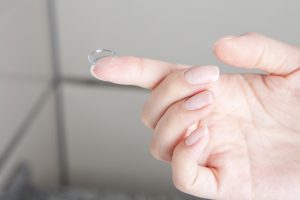 Contact lenses may alter eye bacteria, making eye microbiome more skin-like. In the study of 58 adults, the researchers found that contact lenses induced changes in the eye microbiome, with higher proportions of the skin bacteria such as Pseudomonas, Acinetobacter, Methylobacterium, and Lactobacillus, and lower proportions of Haemophilus, Streptococcus, Staphylococcus, and Corynebacterium.
Contact lenses may alter eye bacteria, making eye microbiome more skin-like. In the study of 58 adults, the researchers found that contact lenses induced changes in the eye microbiome, with higher proportions of the skin bacteria such as Pseudomonas, Acinetobacter, Methylobacterium, and Lactobacillus, and lower proportions of Haemophilus, Streptococcus, Staphylococcus, and Corynebacterium.
The researchers are unsure how these changes occur. Perhaps, “these bacteria are transferred from the fingers to the lens and to the eye surface, or if the lenses exert selective pressures on the eye bacterial community in favor of skin bacteria,” said senior author Maria Dominguez-Bello.
Advertisement
It is well known that contact lens wear increases the risk of eye infections, but while the research is underway for better understanding of the mechanisms behind these findings, the main recommendation for contact lens wearers is to practice proper hygiene and safety precautions when handling contacts.
Contact lens wearers more likely to get an eye infection due to risky eye care behavior
The Centers for Disease Control and Prevention (CDC) estimates that roughly 41 million Americans use contact lenses. According to a new report presented by the CDC, nearly all contact lens wearers engage in risky eye care behavior, which can increase their risk of eye infections and complications.
In the CDC press release, researchers claim that more than 99 percent of survey respondents reported at least one risky behavior regarding their use of contact lenses. Examples of such behavior include wearing contacts while asleep, adding new solution to the existing solution, or wearing contact lenses for longer than recommended. The CDC reports that these practices increase the risk of contracting an eye infection fivefold.
The data was collected through an online survey that was administered to contact lens wearers to determine what kinds of risky behaviors the participants engaged in and how often. An alternative survey was used to gauge the total number of contact lens wearers in the U.S.
Based on the survey findings, the CDC has developed recommendations for contact lens wearers for infection prevention.
Their recommendations are as follows:
- Always wash your hands clean before handling contact lenses or touching your eyes.
- Remove contact lenses prior to entering a shower or pool, or before sleeping.
- Rinse your contacts in disinfecting solution every time they are removed.
- Always use new solution when cleaning contact lenses (do not top off old solution with a new one).
- Replace lenses every one to three months.
- Always carry backup glasses with you in case you need to take your lenses off.
- Eye infection risks associated with contact lenses
Those with impaired vision can choose to wear glasses or contact lenses. One may prefer contact lenses over glasses to avoid having something on your face all day long.
Contact lenses are round, plastic or silicone shaped disks placed on the eye. If worn and handled correctly, contact lenses can be a safe way for correcting your vision, but partaking in risky eye care practices can increase your risk of infection.
Other risks associated with contact lenses are:
- Dry eyes
- Problems with the cornea – swelling, hazy vision, scratches or scrapes on the cornea
- Allergic reactions to contact lens solution
- Deposits on the lens, making them uncomfortable to wear
- Eye inflammation
- Eyelid inflammation
The type of lens you choose can increase your risk of eye infection as well. The best way to avoid complications associated with contact lenses is to follow the recommendations provided on the package as well as the ones presented by the CDC above.
Who should avoid contact lenses
Although contact lenses are generally safe for anyone, in some cases, they can be an unsuitable option. Here are some reasons why contact lenses may not be the right choice for you.
- You are unable or not willing to properly care for them
- You would have a hard time handling the lenses – for example, if you have arthritis
- You have certain medical conditions – uncontrolled diabetes, allergies, asthma, hyperthyroidism, other respiratory disorders
- You have dry eyes or problems with your cornea
- You work in an environment that exposes your eyes to particles, fumes, debris
How to choose right contact lenses?
Advertisement
If you think contact lenses may be for you, here is how you can select the right pair.
- If you have astigmatism within the normal range, you can opt for rigid gas-permeable contact lenses.
- If you can’t handle hard lenses, soft lenses are available for astigmatism and to correct nearsightedness. Soft lenses are more comfortable, but hard lenses offer sharper vision.
Tips on caring for your contact lenses and eye health
Here are a few other tips to keep in mind in order to properly care for your contact lenses and protect your eye health.
- If you have difficulty remembering when to change your lenses, use a chart or alarm as a reminder.
- Never share contact lenses.
- Don’t let the tip of the solution bottle touch other surfaces.
- Wear sunglasses as contact lenses may increase sensitivity to light.
- Use a re-wetting solution to keep your eyes moist.
- If your eyes become irritated, remove the contact lenses immediately.
- If your vision changes suddenly, see your doctor right away.
Although contact lenses are intended to improve your vision, with improper care they can pose a serious threat of infection. Safe contact lens handling will ensure you protect your eyes and vision.
